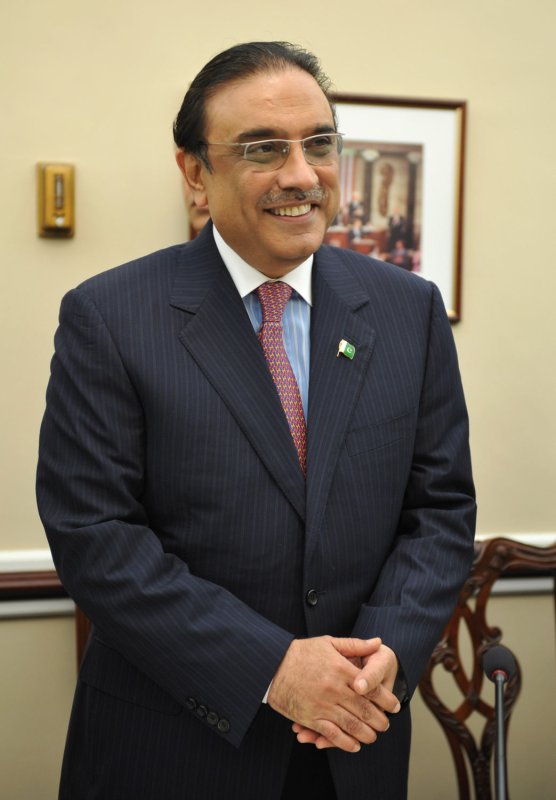1 of 2 | Pakistani President Asif Ali Zardari meets with the House Foreign Affairs Committee on Capitol Hill in Washington on May 5, 2009. (UPI Photo/Kevin Dietsch) |
License Photo
WASHINGTON, May 6 (UPI) -- Two countries, one war. U.S. President Barack Obama and Vice President Joe Biden held a series of meetings Wednesday in Washington with Afghan President Hamid Karzai and Pakistani President Asif Ali Zardari.
U.S. strategy on Pakistan and Afghanistan is in tatters. Obama inherited failing policies on both of them from his predecessor President George W. Bush, but in the three and a half months he has been in office so far, things have gotten worse, not better.
Karzai and Zardari were both handpicked choices of Bush policymakers. The president and his first secretary of defense, Donald Rumsfeld, picked Karzai, and it was Secretary of State Condoleezza Rice who was passionate about supporting Zardari, a political neophyte who was the widower of her friend, assassinated former Pakistani Prime Minister Benazir Bhutto.
Obama is determined to prop up both of them, but it is hard to determine which of the two is a harder sell to the American people.
Karzai's government is fighting corruption along with Taliban uprisings. Some cynics have described him as the mayor of Kabul because his government has so little credibility outside the capital except where there are U.S. and NATO allied troops on the ground to back it up.
Afghanistan has never had a credible central government in its history, but Pakistan has had many of them. Unfortunately, Zardari's is not one of them. He has failed to establish so far any firm control over the notoriously independent Pakistani army or to forge any effective partnership with its commanding generals. He has his own political weaknesses and is now fighting formidable and rapidly spreading Taliban uprisings that are heading remorselessly closer to his capital, Islamabad.
U.S. policymakers express increasing concern over Zardari's ability to keep his nuclear arsenal out of the hands of militants. For the past 11 years, Pakistan has publicly acknowledged its possession and development of nuclear weapons, the first Muslim nation to acquire them. It has at least 30 warheads. Some estimates go much higher.
As he argued through his long election campaign last year, Obama plans to take the war focus from Iraq and shift it to Afghanistan, but the field of battle must be considered to include northwestern Pakistan, where Taliban and al-Qaida militants shift over the border and U.S.-controlled drones find targets of opportunity on both sides of the line.
Obama faces many challenges to his credibility in Afghanistan and Pakistan as an effective leader in the global struggle against Islamic extremism. To prove that his high-profile meetings with Karzai and Zardari are more than empty photo opportunities, he will have to be able to give both leaders tangible expressions of increased and more effective U.S. and NATO support.
That won't be easy. Obama came up empty in his plea to European leaders for more troops for Afghanistan on his European trip, the first overseas visit he took as president.
The Pakistani situation has been steadily deteriorating for years, but the collapse in Zardari's credibility is rapid and was unanticipated by Obama administration planners. The embattled Pakistani leader visits the White House as thousands of refugees are fleeing the fertile Swat Valley that extends south to within 100 miles of Islamabad.
The Taliban are digging in along the valley, and they have declared their peace agreement with Islamabad over. That is a humiliation for Obama as well as Zardari. It was the U.S. president who urged his Pakistani counterpart to accept the peace deal that the Taliban have just broken in record time.
The Pakistani army appears to be finally taking on the Taliban in their own country as Obama, like Bush before him, has repeatedly urged. But there have been such apparently impressive displays for public consumption before, followed by rapid retreats. The fact is that the tough generals commanding the Pakistani army still see the Taliban, who they strongly supported in Afghanistan from 1994 to 2001, as their allies, India as the real enemy and the United States, NATO and Afghan President Karzai as ready to support India instead of them.
There is a similar political and diplomatic mess brewing in Afghanistan. Unlike their predecessors under Bush, Obama administration policymakers don't like Karzai and are keeping him at arm's length. Some senior Obama officials have even expressed open criticism of the Bush administration for being way too close to Karzai, one saying that Bush had become Afghanistan's case officer.
Obama may therefore be tempted to dump Karzai and find a supposedly more impressive replacement, but the prospects of that working are slim. Obama's hero, President John F. Kennedy, made a similar mistake when he approved the toppling of South Vietnam's President Ngo Dinh Diem in 1963. Diem was bad, but his immediate successors were far worse.
The central problem of U.S. policy in Afghanistan is that Obama and Secretary of State Hillary Clinton, like Bush and Rice before them, are determined to create a strong, effective central government, and about the only thing the Afghans themselves agree on is that they don't want one. Therefore, the more U.S. forces pour in to support Karzai, the more he looks like a discredited American puppet.
Pakistan is vastly more important than Afghanistan, and the consequences of its collapse would be far more serious. By conflating the two countries and their interlocking and complex but ultimately very different political, governmental and security problems, the Obama administration runs the risk of defeat and failure in both of them.















